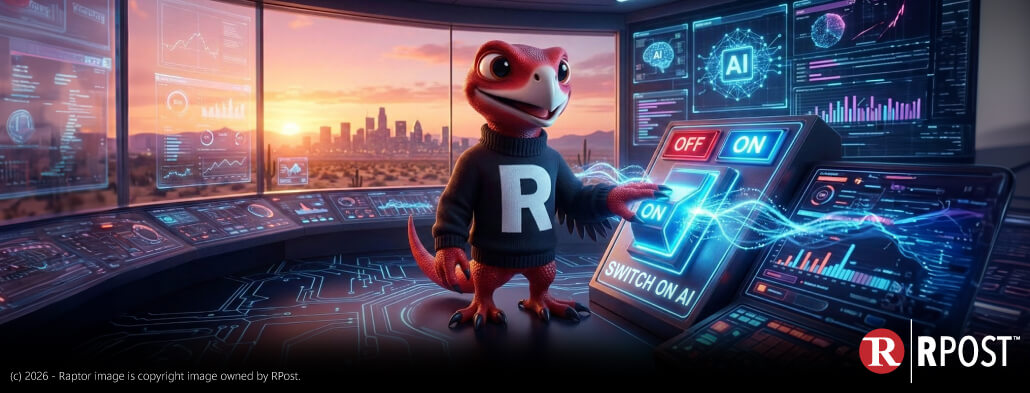
Throughout the year, many of us corporate worker bees are mandated to do some sort of online training (e.g. p-card use, harassment, etc.). The email comes in (tagged important of course), and we are given a few weeks to plan out a time in our busy working lives in which we can sit through 1-2 hours’ worth of videos and quizzes before we are allowed to view/print a certificate of completion that we will presumably then laminate and show our grandchildren.
I realize that these video trainings are a necessary component to working today, and they are vital for compliance. But that doesn’t mean anyone has to like them! (Actually, I do like watching the actors slog through the more uncomfortable scenarios in these videos—they are probably thinking that this performance will be a steppingstone to one day accepting a Golden Globe.)
We at RPost are much more fans of subliminal “in-the-moment-of-sending” email security training; especially when it comes to training users on how to spot impostor email scams, or how to know which email is considered sensitive enough to need to send in a special (compliant) manner, and then of course, how to send that sensitive information encrypted, or with proof of delivery, or for eSignature. So, no, you’ll never have to worry about seeing me awkwardly try to role play in some mandatory email security training video—although I’m sure some of my co-workers would love to see that 😉.
As you may recall, we announced a major RMail product update last year, now available worldwide in all supported languages, that puts real AI within the Outlook compose email user interface. This product, called RMail Recommends™ AI, provides real in-the-moment-of-sending training for staff without the time it takes to train them via long, plodding videos. Imagine continuously educating staff on how to better communicate messages of consequence, how to think about email threats and privacy compliance, about how to reinforce your policies, and how to nudge staff toward safe and more productive behavior — all in the milliseconds from the time they click “send” and before the message sends.
Think, this is akin to having virtual trainers whispering over the shoulder of staff about when to use what special email security and eSign features, and when not to respond to certain types of impostor email — of course without the need to be there. And, here on Earth, not in the metaverse.
This futuristic (but available now) RMail AI component automates the common process we humans think through in milliseconds to determine if a particular message has consequence if its content is leaked or if there may be a future question about who said what when by email.
It’s as simple as clicking a few times to instantly install RMail for Outlook. There’s no need to change any email routing rules or do anything complicated. RMail AI dynamically adapts methods of encrypting, authenticating, and eSigning based on the specific context and mindset of the sender. And all with no multiple-choice quizzes at the end!
Know more:
How to Recall an Email in Outlook
RMail Recommends™ AI has also been proven to both boost adoption and raise email security awareness. It can predict what messages the sender might want to treat in a special manner and gently nudges them to do so, making it easy to track, prove, certify, encrypt, or send encrypted specially to protect against wire fraud and other business email compromise (BEC) attacks, which we have been outlining in this column since last year.
And now, RMail Recommends™ AI is available worldwide in the default RMail settings for users who operate their Outlook interface in English, French, Spanish, Portuguese, German, Dutch, Danish, and in any language and/or specialized for any industry with a special configuration.
The only drawback from using it is that you won’t be able to view/print any completion certificates to frame on your wall.
Install RMail now from the RMail apps center or contact us to discuss how you can get started.

February 27, 2026

February 20, 2026
.jpg)
February 13, 2026

February 06, 2026

January 30, 2026